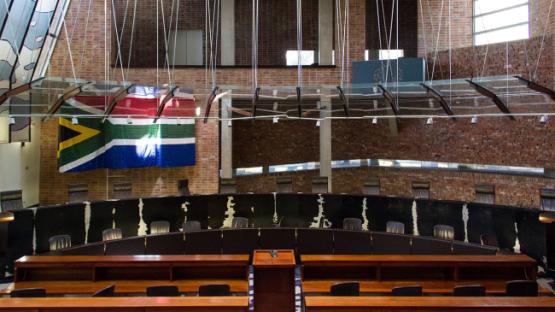
The Constitutional Court of South Africa - Stefan Schäfer on Wikipedia (CC BY-SA 3.0)
PI’s interventions contributed towards a historic decision from the Constitutional Court of South Africa, which ruled that bulk interception by the South African National Communications Centre is unlawful and invalid. This decision held that secret and unchecked surveillance practices used by South African authorities must be explicitly stated in law so they can be considered and debated.

The Constitutional Court of South Africa - Stefan Schäfer on Wikipedia (CC BY-SA 3.0)
Today, the Constitutional Court of South Africa in a historic judgment declared that bulk interception by the South African National Communications Centre is unlawful and invalid.
The judgment is a confirmation of the High Court of South Africa in Pretoria’s powerful rejection of years of secret and unchecked surveillance by South African authorities against millions of people - irrespective of whether they reside in South Africa.
The case was brought by two applicants, the amaBhungane Centre for Investigative Journalism and journalist Stephen “Sam” Patrick Sole, after learning that state spies had been recording Sole’s phone communications for (at least) six months in 2008. The applicants challenged the constitutionality of certain sections of the regulatory framework of South Africa. Specifically, they argued that the Regulation of Interception of Communications Act of 2002 (RICA) and the National Strategic Intelligence Act 39 of 1994 (NSIA) violate the right to privacy and the Court should therefore declare them unconstitutional. Privacy International together with the Right2Know intervened in the case as friends of the court.
Sam Sole during an interview with PI, said:
The problem is to get behind the veil of secrecy. The courts are important in terms of gaining redress, but you can only go to court if you know what has happened […] In terms of the current regime, you never know that you’ve been spied on, you never know that surveillance has taken place because it’s kept secret.
Six years ago, Edward Snowden revealed mass surveillance programmes in the US and the UK, among other states. Governments’ refusal to avow these programmes began to crumble then. But, as we already highlighted in anticipation of the South African case outcome, it still takes significant amount of pressure to shed a light on these practices, including taking governments to court.
The Constitutional Court confirmed that such intrusive powers could not be read into other provisions or be construed as implied by the law. Such powers must be explicitly stated in law so they can be considered and debated. The Court was not persuaded by the South African intelligence authorities’ plea that other states have similar practices. It stated,
I am not convinced that the broad terms of section 2 serve as authorisation for the practice of bulk surveillance. The practice is thus unlawful and invalid, as there is no law that authorises it. (para 135)
The Constitutional Court quoting PI’s intervention noted that bulk surveillane is “an extreme violation of the right to privacy” contrary to international law. Tellingly the Court noted that
the effect of bulk surveillance, i.e. the interception of virtually all internet traffic without a warrant or suspicion about the people whose communications are intercepted, was not denied by the respondents. (para 129)
The Constitutional Court declared
These measures may involve the monitoring of communications – through these technological means – by citizens with others (whether citizens or not). Without doubt, that monitoring constitutes the exercise of public power. And that power can be exercised only in a constitutionally compliant manner. In this regard, the principle of legality requires that any exercise of public power must have a basis in some law. Bulk surveillance must therefore have a legal basis.
It also refuted any claims that South African bulk interception concerned only communications coming from outside South Africa.
It was not necessary for the Court to decide whether a law permitting bulk interception would be constitutionally compliant, as it concluded that there was no such law to begin with. However, the High Court has made it clear that it would not automatically accept the consitutionality of any such law, declaring that the need for clarity was especially acute “when the claimed power is so demonstrably at odds with the Consitutional norm that guarantees privacy.”
Beyond the bulk interception practices, the Constitutional Court sided with the applicants on all remaining counts.
Specifically, the Constitutional Court found that RICA 1) was deficient in failing to provide at least a post-notification procedure for subjects of interception; 2) failed to ensure the independence of the designated judge; 3) failed to provide appropriate safeguards when an order was granted ex parte; 4) lacked appropriate procedures to be followed when state officials examine, copy, share, sort through, use, destroy and/store data obtained from interceptions; and finally, 5) failed to prescribe special procedures for cases when the subject of surveillance was either a practising lawyer or a journalist.
In short, today the South African Constitutional Court found that secret, unregulated mass surveillance is unlawful.
Ilia Siatitsa, Programme Director and Legal Officer, Privacy International said:
Even after the Snowden disclosures, governments refused to acknowledge the existence of these programmes, which could potentially put each and every one of us under the microscope of state surveillance. This judgment will influence not only the developments in South Africa but sets the precedent for other countries to follow: now we have an admission to these practices and a loud judicial statement that such practices interfere with our privacy and should be explicitly and clearly regulated. It constitutes a positive step towards transparency and regulation.